Posted by James (admin) on 10th October 2014
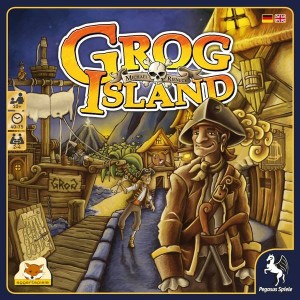 Grog Island is a bidding game but with a healthy amount of different elements riding on the bids so it sounds interesting. It is designed by Michael Reineck whose games include Cuba, Santiago de Cuba, and Palastgeflüster.
Grog Island is a bidding game but with a healthy amount of different elements riding on the bids so it sounds interesting. It is designed by Michael Reineck whose games include Cuba, Santiago de Cuba, and Palastgeflüster.
Each round 5 coloured dice are rolled and players take turns using these dice to make increasing bids. A player can select any combination of the rolled dice and their total bid is equal to the total of the values of the dice they have used. If a player doesn’t want to increase the bid they can pass, and they get a reward for passing too.
The board shows 5 coloured peninsulas with buildings on them (which players will claim during the game) and there is a ship is next to each peninsula (although the ships move around during the game).
The last player remaining in a round wins the bid, pays the value in coins, and receives a benefit for each dice used in the bid (which must be placed in descending value order). The player can claim a building on the peninsula that matches the colour of the first dice and the second dice in the bid. They gain a pirate point for the 3rd and 5th dice (regardless of colour), and locks off a building on the peninsula matching the 4th dice. Players only get rewards for dice used in the winning bid so won’t get all the rewards if all the dice weren’t used.
A player who passes gets 1 goods tile for each dice used in the current bid (as each colour dice matches a colour of good). Also, the player gets to trade with 1 of the ships on the board (allowing them to discard goods tiles that match the colour of the peninsula where the ship is located for the reward shown on the ship). Also, a player can claim a building on the peninsula next to the ship by spending enough tiles of the matching colour. Read the rest of this entry »
Tags: board game news, Board Games, board gaming, Eggertspiele, Essen, Grog Island, Pegasus Spiele, Spiel 14, Spiel 2014
Posted in Board Games, Essen Spiel 14, Grog Island, Preview, Spiel 2014 | No Comments »
Posted by James (admin) on 19th August 2014
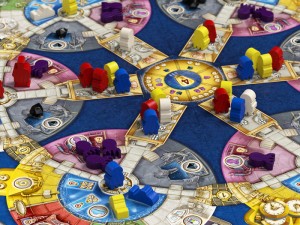 Those of you that have read my blog for a while will know I’m always interested in Stefan Feld’s games as I like how he uses interesting game mechanics. One of his releases this year is Aquasphere which is on the complex end of the scale.
Those of you that have read my blog for a while will know I’m always interested in Stefan Feld’s games as I like how he uses interesting game mechanics. One of his releases this year is Aquasphere which is on the complex end of the scale.
If you see a picture of it, the game looks incredibly complicated but it’s actually relatively simple as far as the mechanics go – it will be working out how to make best use of your actions (as well as doing so whilst other players get in the way) that will be the trickiest part.
The game is set in an underwater base comprised of 6 sectors which each have 7 coloured sections (1 for each type of action). Each player has an engineer who programs their bots, bots that carry out pre-programmed actions, a scientist who determines where the bots carry out their actions, and some submarines. Each player has a player board where their bots and subs are placed, as well as a lab which is where their items are stored (with strict limits). On your turn, you either program one of your bots, carry out an action with a programmed bot, or pass. Read the rest of this entry »
Tags: Aquasphere, board game news, board gaming, Essen, Hall Games, Pegasus Spiele, Spiel 14, Spiel 2014, Stefan Feld
Posted in Aquasphere, Board Games, Essen Spiel 14, Preview, Spiel 2014 | No Comments »
Posted by James (admin) on 1st June 2014
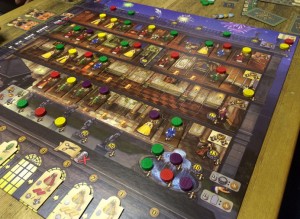 Rokoko is a euro-game about preparing for the ball at the Royal Palace. This may sound pretty light-weight but, do not be fooled, this is a euro-game with a lot of moving parts to work out, balance and combine – so it’s a game for gamers. It’s one of the games nominated for Spiel des Jahres Kennerspiel 2014 (the German complex game of the year).
Rokoko is a euro-game about preparing for the ball at the Royal Palace. This may sound pretty light-weight but, do not be fooled, this is a euro-game with a lot of moving parts to work out, balance and combine – so it’s a game for gamers. It’s one of the games nominated for Spiel des Jahres Kennerspiel 2014 (the German complex game of the year).
Players are aiming to earn the most Prestige Points (PPs) by the end of the game which is 7 rounds long when the ball takes place. Players each have cards which represent their tailors and, at the start of each round, players select 3 of their available tailors to use during that round. Players then take turns using one tailor to perform 1 action and they can also carry out any bonus shown on the tailor’s card too. Tailors are either apprentices, journeymen, or masters and some actions can not be performed by the less experienced tailors, i.e. only journeymen and masters can make dresses, and only masters can hire new tailors. Read the rest of this entry »
Tags: board game news, Board Games, board gaming, Eggertspiele, Essen, Pegasus Spiele, Rococo, Rokoko, SdJ, Spiel 13, Spiel 2013, Spiel des Jahres
Posted in Board Game Review, Board Games, Essen Spiel 13, Rokoko, Spiel 2013 | No Comments »
Posted by James (admin) on 28th May 2014
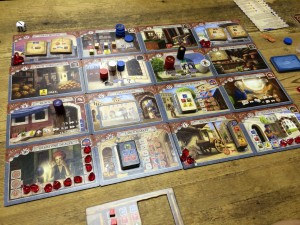
At the bottom of the photo, you can see a player’s hand cart which has yet to be upgraded. When it is, the upgrade tile fills-up part of the missing piece.
Istanbul is one of the games nominated for Spiel des Jahres Kennerspiel 2014 (the German complex game of the year) and is designed by Rüdiger Dorn who has designed a wealth of games. The game is a race to be the first to collect 5 gems with an interesting core game mechanic and a surprisingly dense amount of decision-making.
The board is made up of a 4×4 grid of locations (large tiles) and each player starts with a stack of wooden discs which are their merchant and assistants (with the merchant always on top). Players take turns moving their merchant (and any assistants currently underneath it) so they can use the actions of the location tiles. When a player moves to a location that does not contain one of their assistants, they remove an assistant from their stack, place it on the location, and then take the location’s action. When a player moves to a location that does contain one of their assistants, they add it to the bottom of the stack, and then take the location’s action. If a merchant moves on his own (without assistants) and lands on a location without assistants, then he can not take the location’s action.
So, players already need to work out which locations to visit, in what order, and how to do this by dropping off and picking up assistants along the way. The actions at each location are varied allowing players to gain goods (which come in 4 colours), gain money, buy gems, upgrade their cart, gain special abilities, gain special cards, etc. One location allows the player to gather up any assistants that are elsewhere on the board and place them under their merchant. Read the rest of this entry »
Tags: board game news, Board Games, board gaming, Istanbul, Pegasus Spiele, Rüdiger Dorn, SdJ, Spiel des Jahres
Posted in Board Game Review, Board Games, Istanbul | No Comments »
Posted by James (admin) on 20th May 2014
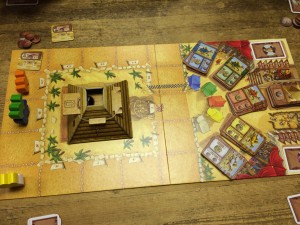 Camel Up is a simple game so it is surprising how much interaction there is and how lively it can be. During the game, camels move around a simple circuit; however, players do not own a specific camel as you may expect. Instead, players take actions which can move the camels as well as try to predict which camel will win the current round, as well as the overall race. The winner is the player with the most money (Egyptian Pounds, or EPs) at the end of the game.
Camel Up is a simple game so it is surprising how much interaction there is and how lively it can be. During the game, camels move around a simple circuit; however, players do not own a specific camel as you may expect. Instead, players take actions which can move the camels as well as try to predict which camel will win the current round, as well as the overall race. The winner is the player with the most money (Egyptian Pounds, or EPs) at the end of the game.
Players take turns by performing one of 4 actions which are:
1. Move a camel
The player drops 1 dice out of the pyramid and moves the matching coloured camel that number of spaces forwards along the track. (There are 5 dice – one for each camel each with values 1 to 3 – more about the pyramid later.) If camels are moved to space occupied by camels they are stacked on top of those already there. When camels move, they carry any other camels already on top of them along with them too. This action earns the player 1 EP. (The dice only get placed back in the pyramid after all 5 have come out which and this ends the round.)
2. Place/Move their desert tile on the race track
This tile earns 1 EP for its owner each time a camel lands on it, plus it moves that camel forwards 1 space if the tile is oasis side-up, or backwards 1 space if the tile is mirage side-up. Read the rest of this entry »
Tags: board game news, Board Games, board gaming, Camel Up, Eggertspiele, Pegasus Spiele, SdJ, Spiel des Jahres
Posted in Board Game Review, Board Games, Camel Up | 2 Comments »
Posted by James (admin) on 9th October 2013
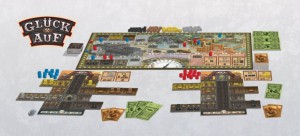
Wolfgang Kramer and Michael Kiesling have an impressive track record in their design partnership with games like the excellent Palaces of Carrara, Tikal, Tikal II, Torres and Asara. In fact, Kramer has won the Spiel des Jahres 5 times (twice with Kiesling). So, I’m always interested in any game they create.
Glück Auf is a worker-placement mining game. Each player has their own mine which has 4 levels (each providing a different type of coal) and a lift shaft down the centre. The coal trucks you buy during the game must be placed on the matching level and they must also be placed on one side of the lift shaft of the tunnels they are in are torch-lit, or placed on the other if their tunnels are dark.
In the centre of the table is the main board where players place their workers to (a) gain coal orders, (b) gain cash, (c) buy mine trucks (which start coal filled in the relevant mine level), (d) gain movement points (which are used to move the coal and the lift to get the coal to the surface), and (e) deliver completed orders. The action spaces for delivering orders allow a player to deliver any completed orders that match the action space’s transport method, i.e. a player using the delivery action space showing a train can deliver any complete orders they have with a train on them. Read the rest of this entry »
Tags: board game news, Board Games, board gaming, Eggertspiele, Essen, Glück Auf, Pegasus Spiele, Spiel 13, Spiel 2013
Posted in Board Games, Essen Spiel 13, Glück Auf, Preview, Spiel 2013 | No Comments »
Posted by James (admin) on 8th October 2013
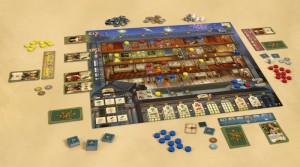
In Rokoko, players are tailors who are trying to gain the most notoriety at the royal ball of Louis XIV by outfitting the nobles. As you can see from the image of the game (which is what caught my eye in the first place), it’s a Eurogame with quite a lot going on. Plus, it’s by Eggertspiele and Pegasus Spiele so that also drew my attention.
Each round, players take turns taking one of the 6 actions such as gain resources (the different materials required to make outfits), gain patterns (the outfits to be made), hire employees, add a decoration to the ball’s location, etc. Like you would expect from a Eurogame, players are trying to get the resources to make the best items, as well as other aspects, in order to score points.
However, it is not completely straight-forwards as simply picking an action. Each player has a deck of employee cards (and they can hire new ones, and fire existing ones, during the game). Each round, players secretly select 3 of their employees to use from their employee draw deck and they use each employee to perform 1 action. Some actions can only be performed by specific types of employees; for example, the Master tailor can do any action; whereas, the Apprentice tailor can’t make a dress or hire an employee.
Read the rest of this entry »
Tags: board game news, Board Games, board gaming, Eggertspiele, Essen, Pegasus Spiele, Rokoko, Spiel 13, Spiel 2013
Posted in Board Games, Essen Spiel 13, Preview, Rokoko, Spiel 2013 | No Comments »
Posted by James (admin) on 19th August 2013
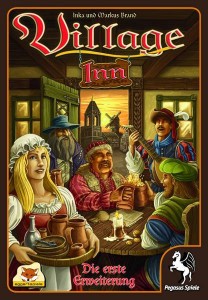
I really like Village as a game – it has you juggling lots of things at once without enough time or resources to do everything; you have to think about the other players who may take the actions/resources you want before you do so you have to prioritise what you take first and maybe alter your plans on the fly if someone has now taken something you were going to; and, players sometimes kill off their villagers on purpose so they can grab their points scoring positions in the village’s journal and by doing so means you have to watch out for the game ending sooner than you think or want. This makes a very entertaining game and I was glad it deservedly won the Spiel des Jahres last year. (The following assumes you know about the Village base game – if not, you can read my review of it here.)
As I liked the main game, I was pleased to hear there would be an expansion. However, I have realised over the years that the majority of expansions (especially for non-narrative games) end up adding more noise than gameplay – some friends and I worked out recently that we usually buy expansions because we’d like to see extra variety, but then more often end up playing the base game without the expansion because it’s usually tighter. So, into which of these categories was Village’s expansion (called Village Inn) going to fall? Read the rest of this entry »
Tags: board game news, Board Games, board gaming, Pegasus Spiele, SdJ, Spiel des Jahres, Village, Village Inn
Posted in Board Game Review, Board Games, Village, Village Inn | No Comments »
Posted by James (admin) on 19th June 2013
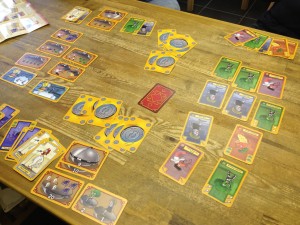 We Will Wok You is a quick card-game for 2-4 players. The theme is that the players are providing food at a music concert. On the table are recipe cards and ingredient cards. Each ingredient card shows one ingredient as well as one or two symbols (bowl, chopsticks, etc.) Recipe cards show how the player that owns the card can score victory points (VPs) at the end of the game and the player with the most VPs wins.
We Will Wok You is a quick card-game for 2-4 players. The theme is that the players are providing food at a music concert. On the table are recipe cards and ingredient cards. Each ingredient card shows one ingredient as well as one or two symbols (bowl, chopsticks, etc.) Recipe cards show how the player that owns the card can score victory points (VPs) at the end of the game and the player with the most VPs wins.
At the start of the game, 4 coin cards are placed next to 2 rows of 2 ingredient cards, and 6 coin cards are placed next to 2 rows of 3 ingredient cards – the coins indicate the price of the rows that they are next to. On their turn, a player must do one of three actions:
Buy ingredients: The player pays coins equal to the number of coins next to the row purchased. New ingredient cards are drawn to replace the bought row and the spent coins are added to the price. As a result, buying a row of ingredients raises the price of the ones that replace those bought as well as the other row of the same length.
Take a coin: The player takes one of the coin cards that show the prices of the ingredients. Taking a coin means some ingredients will be cheaper for the next players.
Gain a recipe card: The player places cards from their hand onto the table which have a total of 4 matching symbols (the ingredients on the cards are not important for this) and this allows the player to take any one of the remaining recipe cards. Read the rest of this entry »
Tags: board game news, Board Games, board gaming, Pegasus Spiele, We Will Wok You
Posted in Board Game Review, Board Games, We Will Wok You | No Comments »
Posted by James (admin) on 11th June 2013
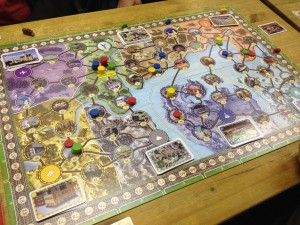 Wunderland is a game set at the massive, real-world, model village in Germany which covers 1,300 square metres. Players aim to earn the most victory points (VPs) by completing destination tickets and collecting postcards – the player with the most VPs at the game’s end wins.
Wunderland is a game set at the massive, real-world, model village in Germany which covers 1,300 square metres. Players aim to earn the most victory points (VPs) by completing destination tickets and collecting postcards – the player with the most VPs at the game’s end wins.
Each player has 8 visitor tokens and these all start on the main start space. The board shows lots of numbered spaces (locations) which are linked by various pathways and are located in 8 different regions (such as Hamburg, Austria, Scandinavia, USA). On their turn, a player can move any number of their visitors from one single location to another location that is 1 or 2 locations away (so a player can leave some of their visitors behind if they want); then, each other player can choose to move some of their visitors with those that were moved (if they had any on the same location).
This is a nice and simple game mechanic. Players can move their visitors quite quickly if they tag along with each others’ visitors, but players can also go their own way and be on their own spaces so they don’t benefit anyone else when they move. It’s a double-edged sword – you don’t want to help other players move towards their goals, but you want to tag along with other players when they move. Also, this game mechanic keeps the game flowing very quickly (as a turn is short) and there is very little downtime (as players are very often involved in moves when it isn’t their turn). Read the rest of this entry »
Tags: board game news, Board Games, board gaming, Pegasus, Pegasus Spiele, Wunderland
Posted in Board Game Review, Board Games, Wunderland | No Comments »
 Grog Island is a bidding game but with a healthy amount of different elements riding on the bids so it sounds interesting. It is designed by Michael Reineck whose games include Cuba, Santiago de Cuba, and Palastgeflüster.
Grog Island is a bidding game but with a healthy amount of different elements riding on the bids so it sounds interesting. It is designed by Michael Reineck whose games include Cuba, Santiago de Cuba, and Palastgeflüster.


 Rokoko is a euro-game about preparing for the ball at the Royal Palace. This may sound pretty light-weight but, do not be fooled, this is a euro-game with a lot of moving parts to work out, balance and combine – so it’s a game for gamers. It’s one of the games nominated for
Rokoko is a euro-game about preparing for the ball at the Royal Palace. This may sound pretty light-weight but, do not be fooled, this is a euro-game with a lot of moving parts to work out, balance and combine – so it’s a game for gamers. It’s one of the games nominated for 





